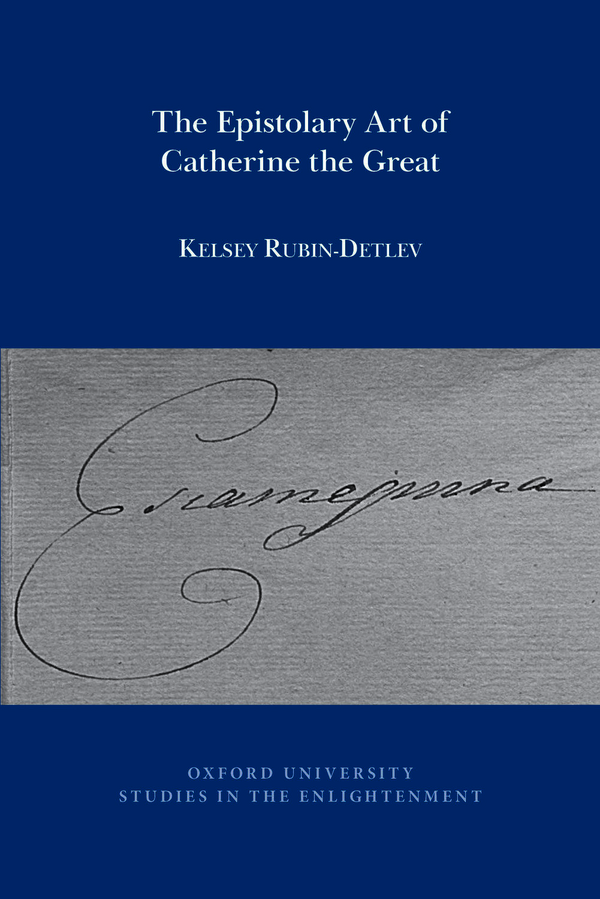
The Epistolary art of Catherine the Great
Kelsey Rubin-Detlev
Oxford University Studies in the Enlightenment
ISBN: 9781789620078
416 pages
£65.00
PRESENTATION
The first to analyse comprehensively the letters of Empress Catherine the Great of Russia, this study traces Catherine’s development as a letter-writer, her networking strategies, her image-making, and the materiality of her letters. It argues that her letters were her literary masterpiece and a key means by which she participated in the intellectual and social life of the Enlightenment.
- An exciting new perspective on image-making and networking by letter.
- A reconsideration of Catherine the Great’s place in the Enlightenment, emphasising the intellectual complexity and richness of her epistolary writings, as well as her self-positioning within the social, political, and intellectual elites of Enlightenment Europe.
- The first book to analyse in-depth the correspondence practices of an eighteenth-century monarch in all domains, from the official to the intellectual and the intimate.
TABLE OF CONTENTS
List of illustrations
Acknowledgements
List of abbreviations
Note on dates, quotations and transliteration
Introduction: Catherine the Great, letter-writing and the elite Enlightenment
The letters of Catherine the Great
The elite Enlightenment of Catherine the Great
Chapter 1: Catherine the epistolarian
Catherine’s epistolary education: 1742-1762
Catherine’s début: 1762-1774
In transition: 1774-1781
Mastery: 1781-1789
An Enlightenment monarch in a Revolutionary world: 1789-1796
Catherine’s epistolary geography
Catherine and her contemporaries
Chapter 2: Catherine the Great and eighteenth-century epistolary style
Lettres galantes
Lettres familières
Portrait and narrative letters
Love letters
Chapter 3: Fashioning the great Enlightenment monarch
Gender and epistolary self-fashioning
Catherine’s image as an Enlightenment intellectual
Fashioning greatness
The correct exercise of military might
Compensating for military heroism: flourishing provinces
Patronage of the arts and sciences
Ethical greatness
The legislator
Chapter 4: The play of authority in epistolary form
Authority and linguistic mastery
Authority and writing practices
Epistolary etiquette
Paper use
Datelines
Salutations
Closers
Foregoing etiquette
Affection-seeking formulae
Postscripts
Signatures, addresses and attachments
Chapter 5: Epistolary publicity and the audience for Catherine’s correspondences
The injunction against publication
Building reputation through networks of epistolary sociability
Managing celebrity through epistolary circulation
From reputation to glory: writing for posterity by addressing gens de mérite
Chapter 6: Greatness contested: Catherine’s epistolary response to the French Revolution
Chronology of Catherine’s epistolary actions against the French Revolution
Old and new in Catherine’s epistolary style
Greatness contested: confronting the past
Conclusion: new readers and new ways of reading Catherine’s letters
Bibliography of works cited
Archival sources
Editions of Catherine’s letters
Secondary sources: English
Secondary sources: French
Secondary sources: Russian
Secondary sources: German
Secondary sources: Italian
Index
---
" 'Burn my letters so that they will not be printed in my lifetime' — Catherine the Great wrote these words to one of her most trusted correspondents, Friedrich Melchior Grimm, in 1787. Note the caveat—Catherine did not really want her letters to be destroyed. What she sought was control over who read her letters, when, and how." (Read the author's accompanying blog post)
---
Kelsey Rubin-Detlev is Assistant Professor of Slavic Languages and Literatures at the University of Southern California. Her work focuses on the literature and culture of eighteenth-century Russia in European context, in particular correspondence, women’s writing, and Catherine the Great. She is the co-translator with Andrew Kahn of Catherine the Great, Selected Letters (Oxford University Press, 2018).
The Oxford University Studies in the Enlightenment series, previously known as SVEC (Studies on Voltaire and the Eighteenth Century), has published over 500 peer-reviewed scholarly volumes since 1955 as part of the Voltaire Foundation at the University of Oxford. International in focus, Oxford University Studies in the Enlightenment volumes cover wide-ranging aspects of the eighteenth century and the Enlightenment, from gender studies to political theory, and from economics to visual arts and music, and are published in English or French.